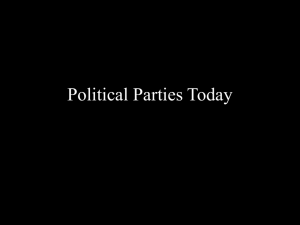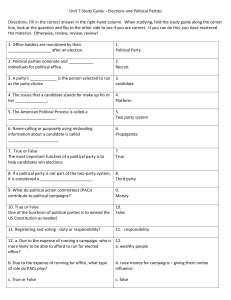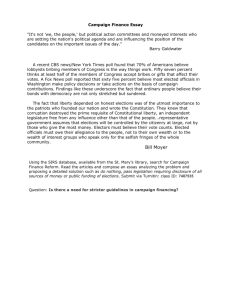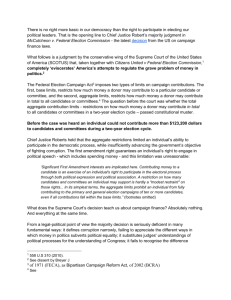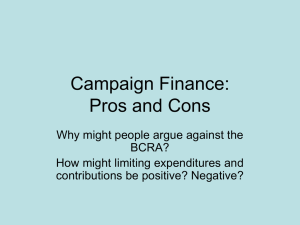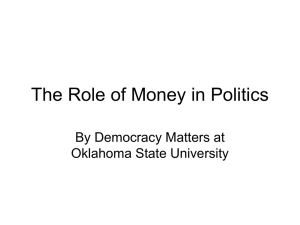View the powerpoint presentation here
advertisement
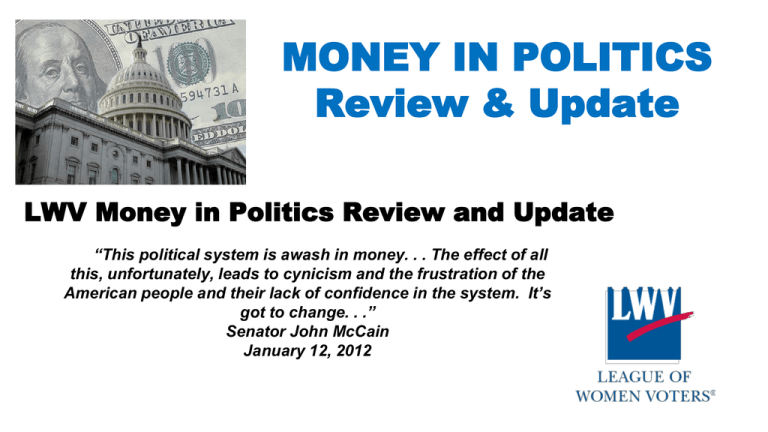
MONEY IN POLITICS Review & Update LWV Money in Politics Review and Update “This political system is awash in money. . . The effect of all this, unfortunately, leads to cynicism and the frustration of the American people and their lack of confidence in the system. It’s got to change. . .” Senator John McCain January 12, 2012 LWV WORK ON MONEY IN POLITICS Using this position, the League has worked toward two main goals in recent years: •Transparency in financing political campaigns •Fighting big money and its corrupting influence in elections and government LWV POSITION ON CAMPAIGN FINANCE • Methods of financing political campaigns should: • • • • Ensure the public’s right to know Combat corruption and undue influence Enable candidates to compete more equitably Allow maximum citizen participation in the political process • Applicable to all federal campaigns for public office — presidential and congressional, primaries and general elections. May be applied to state and local campaigns. 1998-2014 EXPENDITURES From Open Secrets.org 2014 Another Way • House – 1442 candidates – $1,032,840,762 raised – Average amount raised about $716,256 • Senate – 229 Candidates – $658,358,749 raised – Average amount raised about $2,656,600 Based on data released by the FEC on 19 February 2015. http://www.opensecrets.org/overview/ The First Amendment to the Constitution protects the right of every American to speak out. “Congress shall make no law . . . abridging the freedom of speech, or of the press . . .” CITIZENS UNITED DECISION “This Court now concludes that independent expenditures, including those made by corporations, do not give rise to corruption or the appearance of corruption.” Justice Kennedy Writing Majority Opinion “All speakers . . . use money amassed from the economic marketplace to fund their speech, and the First Amendment protects the resulting speech.” (2010) JUSTICE STEVENS’ DISSENT QUID PRO QUO… • • • A Latin phrase that means “this for that.” An explicit agreement by a candidate or elected official to perform a specific act in exchange for something of value. The only kind of corruption the Supreme Court recognizes is quid pro quo. Hard Money Money in Elections Lobbying Candidates •Caps on Contributions •Disclosure Fundraising Bundling Soft Money Dark Money 501(c)(4)'s •No Disclosure •No Cap on Contributions •Expend Only 50% On Electioneering Political Parties & PACs Caps on contributions Disclosure Super PACs •Independent Expenditures •No Caps on Contributions or Expenditures Results of Citizens United Donations 2016 Election Cycle Outside Money vs Candidate Committee Jeb Bush (R) Hillary Clinton (D) Ted Cruz (R) Bernie Sanders (D) Ben Carson (R) Marco Rubio (R) $103,222,384 $24,814,730 $20,291,679 $77,471,604 $38,634,164 $26,567,298 $25,044 $41,463,784 $6,844,987 $31,409,509 $17,315,782 $15,515,638 Dark Money (in blue)vs candidate committee money(black) Current Issues Post Citizens United • Role of Congress limited due to Supreme Court decisions. • Supreme Court ruled First Amendment ensures that speech cannot be limited. • Corporations granted same free speech rights as individuals by Supreme Court. • Definition corruption narrowed quid pro quo. The role corporations and influence in government is an historical problem. 16 Arguments Against Campaign Spending Restrictions • • • • • Combat corruption and undue influence in government Prevent distortion of election process by big spending Enhance political equality Enable candidates to compete equitably Reduce time and effort elected officials and candidates expend on campaign fundraising • Ensure transparency and disclosure so voters may be informed Arguments For Unlimited Campaign Spending • Money allows the funding of modern communications, which is essential to reach voters • Political communication informs the voters • A candidate taking contributions does not mean if elected that official will do favors for the contributor • First Amendment guarantees free speech .. Proponents of limits see the issue Regulatory Approaches • Adopt a Securities and Exchange Commission rule governing corporate political expenditures. • Strengthen and enforce 501(c)(4) political activity rules by the IRS. • Enforce campaign finance laws (action by the FEC and state regulatory agencies) 20 Federal Election Commission • Six member bipartisan federal commission • Enforcement, regulatory, and interpretive authority over federal campaign finance law. • Four votes required to act. Congressional Options Congress can pass laws to • Require disclosure of donors who fund through outside spending • Tighten rules governing coordination spending • Adopt public funding for candidates for all federal offices (more states could also adopt public financing) • Prohibit members of Congress from fundraising from interests they most regulate 22 Additional Approaches • Seek to have Buckley and/or Citizens United overturned by the Supreme Court • Work electorally for a Congress comprised of members committed to reform (action by the grassroots) 23 Constitutional Amendment Solution • Proposal for Constitutional amendments to reform MIP • 16 states have called for this solution • Opponents criticize lengthy process • Proponents say would generate public awareness 24 VOTE! • • • • Local Elections State Elections National Elections Encourage your friends, families and neighbors to be active, involved citizens like you! Come join the effort and become a member of LWV, if you are not one already! Discussion Points • What should be the goals of campaign finance reform? • In what ways does the First Amendment limit reform of MIP? • Should we look beyond the First Amendment to other Constitutional principles? • Is public funding of campaigns a viable way to prevent corruption? 27
